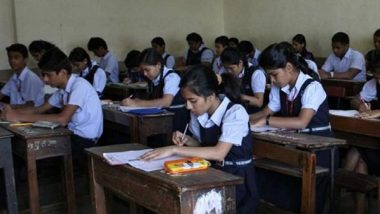New Delhi, May 24: Warning against "revenge pornography", setting limits to online friendships, valuing consent and reporting to elders if faced with a problem, are among lessons the Central Board of Secondary Education (CBSE) wants teenagers to learn to ensure their safety in the virtual world.
While the digital exposure of students has increased due to teaching activities moving completely online during the coronavirus-induced lockdown, concerns about the potential threats have been brought to the forefront with the recent "Bois locker room" controversy. Bois Locker Room Instagram Chat Group of Delhi Teenage Boys Glorifying Gang Rape Busted by Twitterati; Delhi Police Action Sought.
The CBSE has shared a Cyber Safety handbook with schools for class 9 to 12 students. The handbook also details guidelines for students as well as parents, listing the do's and dont's and activities to understand the sensitivity of the issue.
"Students must learn to set limits to their online friendships as well as online communication with real life friends. There has to be a limit to what they share or exchange in terms of written words, photographs or videos. They must remember that, once online, they may not be able to control who will actually see it, prevent breach of trust and misuse and potential risk and harm to their person and reputation," a senior board official said.
"Teenagers need to understand gender relations. Boys must learn to interact with girls on equal terms and respect them and their desires as those of human beings, not simply as objects of respect or desires," the official said.
"Consent must be an important part of relationships. Pictures, videos and other material shared in confidence cannot be published on social media without the permission of the person just because the other person does not want to continue in a relationship. Youngsters must learn to cope with rejection as it is a part of life but not the end of the world," the official added.
The board has advised parents to empower children to decide for themselves how others collect and use their information by requiring their consent.
"As of now, there is no minimum age of digital consent in India. If there are people offline who you would be uncomfortable talking to about your physical or sexual experiences, chances are, you would be uncomfortable doing this with strangers online too. Cyber Groomers create fake accounts to befriend people, for the purpose of harming them whether physically, sexually or emotionally," the official said.
"Students must be cautious when their chat partner gives them many compliments regarding their appearance within a short span of their acquaintance. Do not talk to people who ask you to share your sexually explicit photographs or videos. Never accept a friend request from someone you have never met in person. If you share your sexually explicit photos or videos with someone, the person can share those photos with others or post them on social media. They can also blackmail you," the official added.
The handbook warns against falling into the trap of revenge pornography.
"Teenagers in the age-group of 14 to 18 years are the worst victims of revenge porn as well as the perpetrators themselves, which is a matter of concern.
Some teenage students who have been in a relationship and end it find their explicit photographs circulated on social media platforms. When such images go viral, students are often harassed and bullied by their peers – branded with insult and in the end, isolated," the handbook states.
"A teenager may be targeted by her jealous classmates, her ex-boyfriend or even an unknown friend on social media who may be victimising her because she stopped communicating with him when she realised the dangers of online relationships," says the handbook.
Earlier this month, a massive outrage erupted online after it emerged that an Instagram group named ''bois locker room'' was being used by some persons to share objectionable pictures of minor girls and discuss illegal acts including rape.
People posted purported screenshots of crude conversations among members of the group – believed to be students of some top schools in Delhi and some allegedly as young as 13. It is alleged that they shared photos of teenage girls and made explicit comments about their looks.
However, during its investigation into the 'Bois Locker Room' case, the Delhi police has stumbled upon a conversation on Snapchat where a girl, posing as a male, suggested a "sexual assault plan" to a boy just to test his "values and character".













 Quickly
Quickly


